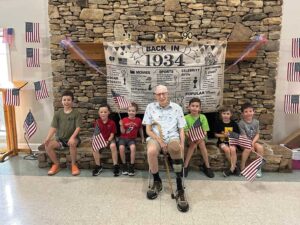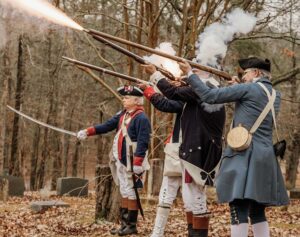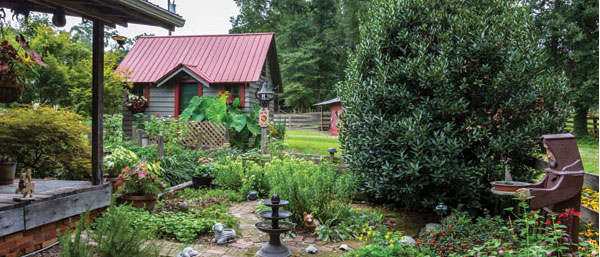
Sugarbush Farm: Antiques
and so much more
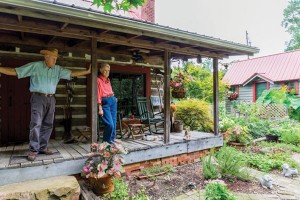 Story by Carol Pappas
Story by Carol Pappas
Photos by Michael Callahan
Submitted Photos: Sugarbush Farm
If you weren’t looking for it, you just might miss the small sign out front that says, Sugarbush Farm. But if you passed by what lies just beyond it, rest assured, you missed out on something mighty special.
Tucked snugly behind the home that is barely distinguishable from others along Pell City’s Wolf Creek Road South is an 1850 cabin restored on the property and connected to the existing house. A few feet away stands another relic, a motel room from the old Rose Hill Motel in Irondale, which thrived in the 1930s and 40s.
But just around a dirt bend above the home of Jo and Paul Harris are the stables that once boarded more than 20 horses at a time. The covered arena across the way was once alive with the sound of children, horse hooves, riding lessons, shows and the nationally sanctioned Wolf Creek Pony Club.
As she turns the pages of photo albums and books, the familiar look of remembrance is unmistakable. So is the smile that accompanies it.
Jo and Paul moved to Pell City in 1973. He was a familiar face around St. Clair County, having graded cattle herds for the Extension Service. He judged 4-H and Future Farmers of America steer shows as well.
Paul had been a partner in a cattle corporation, sold his partnership and bought his own herd of Polled Herefords for breeding, leasing land around the county to raise his cattle. But during the Nixon administration, interest rates stood at 21 percent, and the president put a freeze on cattle prices. “It put us out of business,” Jo said.
But the couple was not to be deterred by the setback. Jo remembers telling Paul at the time, “You had your turn, let’s try horses.” Horses had been a passion of hers from an early age growing up in Oklahoma.
They secured their first boarder and “built from there,” she said. They developed a riding school with summer camps. She became certified as an instructor in the American Riding Instruction Certification Program. “I was working with an accounting firm and spent summer vacations with riding camps.”
Paul built the covered arena, and they would hold adult riders dressage clinics with a United States Dressage Federation instructor.
In the late 1980s, the Pony Club was chartered by the U.S. Pony Clubs – no small feat for a tiny town 40 miles outside the big city. It drew members from Moody, Talladega, Anniston, Birmingham and of course, its home in Pell City. “On Sunday afternoon, I gave lessons, and we held weekend competitions. We had a lot of fun,” she said as she thumbed through dozens of old photographs.
Sugarbush Farm was on the map as a pony club. “I’d like to think I made a difference with the kids,” she said. “I can’t say how many kids over the years, but my first student, Carrie Henderson, is now giving riding lessons in California.”
When health took its toll and she was unable to ride any longer, she acquired a Meadowbrook cart. In 2004, she traveled to Beaver Dam Farm in Nova Scotia to take a driving course. “That was the only time I got to ride on the beach.” She drives it now on a trail behind her home.
The cabin that Paul built
Jo and Paul’s homeplace is far from typical. They bought the 1850 cabin near the Shiloh battlefield in Tennessee. It was dismantled and moved to Pell City, where it took Paul two years to reassemble it. “You can still see the numbers on the logs,” she said.
There seems something familiar about the interior, perhaps because it was the setting for a handful of Southern Living Magazine photo shoots for various publications and occasions over the years. The coziness and the warmth envelops you as you enter, and the antiques Jo has collected over the years are the picture-perfect complement. Century-old quilts, shaker boxes and a cavernous fireplace as the focal point cannot help but send any visitor back in time.
Not your typical antique store
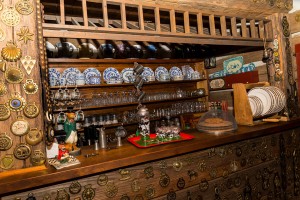 Step out back just across the gardens, and you’ll discover another remnant of days gone by – Jo’s antique shop. Sugarbush Farm Country Antiques and Folk Art is more than a sight to behold. It’s a treasure to savor.
Step out back just across the gardens, and you’ll discover another remnant of days gone by – Jo’s antique shop. Sugarbush Farm Country Antiques and Folk Art is more than a sight to behold. It’s a treasure to savor.
Jo had passed by the vacant Rose Hill Motel many a time, seeing the motel cabins and wishing she had one. Her son discovered later they were for sale, and they bought two — one for her antique shop and the other serves as a guest house on her son’s land just across the way.
Its 192-square-foot frame encases rare collectibles Jo has just displayed for sale. She has reopened the antique shop and is hoping to pique the interest of antique and collectibles enthusiasts. She figures, she said, “If I get rid of it, the kids won’t have to.”
The collection is far from anything to be ‘gotten rid of.’ Hand-woven coverlets from York, Pennsylvania, and a 19th century coverlet hang from a quilt rack. Rows of shelves display her prized Blue Willow china with the buffalo mark on the back, signifying its century of age.
A butter churn reminds her of the days growing up on a dairy farm. “We made our own butter” and cooked from the garden. “I don’t think we went to the store except to buy flour and sugar,” she says.
French flatware, a William Britain Soldiers collection from England and Blue and White enamelware are but a few of the “finds” in her shop. There are delftware made in Holland, Blue Onion kitchen utensils and vintage Spring Bok puzzles, similar to jigsaw. There is even a collection of harness brasses used to decorate tradesman horses in England, the harness brass branded with the trade just as a logo would be used today.
“I have been a collector all of my adult life,” she says. She bought “things my mama used to have. I like to think back to the days when she did her canning.” And she quickly adds, “I don’t want to do it, I just want to remember it.”
Throughout the shop, the cabin and the 30 acres Jo and Paul call home these days, those memories of the past abound.
Jo sums it up in a simple, yet poignant thought that could be applied to antiques and memories alike: “I guess I’m just a collector at heart.”


































